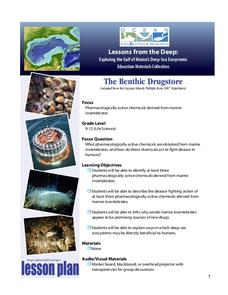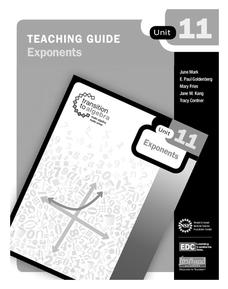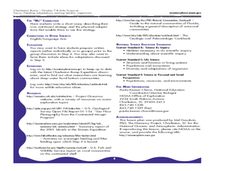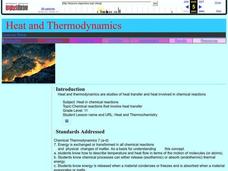Curated OER
Environmental Agents of Mathematics: Mathematics for Change
High schoolers analyze environmental science data using Math. They do research about renewable energy, gather data, create graphs and interpret their findings. Then the group presents their arguments persuasively using their findings to...
Lunch Lab
Exercise
This is the perfect resource for helping youngsters understand the importance of physical activity in their daily lives. The lesson and its worksheets focus on brainstorming a variety of fitness activities, such as games you can play...
Teach Engineering
Fun With Nanotechnology
Introduce your class to nanotechnology applications with three demonstrations that showcase scientific principles related to ferrofluids, quantum dots, and gold nanoparticles. Groups will work more closely with these applications in the...
NOAA
Importance of Deep-Sea Ecosystems – Chemists with No Backbones
Marine invertebrates offer us many new options for developing pharmaceutical drugs, such as w-conotoxin MVIIA, which is extracted from the cone snail and is a potent painkiller. The lesson encourages scholars to research various types of...
NOAA
Importance of Deep-Sea Ecosystems – The Benthic Drugstore
You never know what you will find next in the deep sea ecosystem. So far, scientists have found items that work as anti-tumor agents, anti-inflammatory agents, agents that stop uncontrolled cell division, and much more. The lesson begins...
California Department of Education
Ready, Set, Test!
Ready to prepare young scholars for their first placement test experience? Give them the support they need using a test-focused instructional activity. Fifth in a series of six junior-level college and career readiness instructional...
Curated OER
Benefits of Indoor Plants
Learners diagram a plant. In this Science activity, students explore the concept of photosynthesis focusing on the oxygen production. Learners calculate the amount of plants needed to filter the air in their classroom.
Geography 360°
Exponents
Don't let the rules overrule the lesson. Mental math steps in and helps learners understand exponent patterns. The material focuses on the introductory problems of exponents, such as simplifying expressions. Teacher guides are...
NOAA
Biological Oceanographic Investigations – I, Robot, Can Do That!
How do you decide the best person for each job? Would it be easier if you didn't have to consider their feelings? The lesson begins with a discussion of underwater robots. Then groups research one of these robots and present their...
Curated OER
Save a Reef!
Design a public information campaign to improve understanding of the coral reef crisis. Read about and discuss the biology and threats to the coral reef. The class creates a public information program about the problems facing the coral...
Curated OER
Sorting
Young scholars examine Library organization. For this logic lesson, students watch a Between the Lions episode and consider how the library has been organized. Young scholars each list their 3 favorite book titles and how they would...
Curated OER
How Am I Supposed to Eat THAT?
Students explain nutritional strategies of benthic organisms.They describe nutritional strategies of benthic organisms and describe these physical characteristics.
K12 Reader
How Things Move
As part of a comprehension exercise, kids read a physical science article about motion and then answer a series of comprehension questions based on the passage.
K12 Reader
Limited Resources
The difference between renewable and non-renewable resources is the focus of a short reading comprehension worksheet that asks kids to respond to a series of questions based on the provided passage.
Museum of Tolerance
Influence of Media
We are bombarded with media images expressly designed to influence viewers. Learning how to analyze the intended effects of these images is essential and the focus of an activity that asks viewers to use the provided questions to guide...
Common Core Sheets
Comparing Fraction Relative Size
Which is the larger amount? Two-fourths of 10 dollars, or one-fourth of 100 dollars? This type of question is the main focus of a learning exercise that has learners comparing fractions by their relative size. Each problem contains...
NOAA
Build Your Own Ocean Ecosystem
Hold the sea in the palm of your hand! Amateur oceanographers work together to create models of an ocean ecosystem in the sixth and final installment in a series. Raise awareness of global ocean health issues through guided research,...
Curated OER
Who Was That Man?
Develop historical analysis and interpretation with your older students. They will study and analyze three given interpretations of Christopher Columbus' life, which includes significant events, his character, and the impact he made on...
Curated OER
Our Solar System - Comparing Planetary Travel Distances
NASA presents a mini-unit on distances in our solar system. It incorporates scientific concepts of gravity, mass, density, and payload while your aspiring astronauts also employ mathematics skills. They calculate speed, they determine...
University of North Carolina
Anthropology
Anthropologists ask the question that everyone wants answered: what does it mean to be human? An online handout provides a brief introduction to the study of anthropology and outlines three common types of anthropology writing...
Curated OER
Canine Companions
How do you make a pet’s transition into your family a smooth one? Preparing for a pet and learning how to keep it safe is the focus of this research lesson. After searching the Internet for tips on animal care, pet owners and potential...
K12 Reader
Solids, Liquids, & Gases
Solids, liquid, and gas, the three states of matter, are the subject of a cross-curricular reading comprehension exercise that asks kids to first read an article about these forms, and then to respond to a series of questions based on...
Curated OER
Faking It
Middle school earth scientists describe the behavior of the Coriolis force. They compare and contrast conditions under which the Coriolis force has a significant impact with conditions under which it has very little. They model the...
Curated OER
Heat and Thermodynamics
This is actually a 10-day mini unit on thermal energy for your high school chemists. Every avenue is taken to get learners absorbed in heat: a pretest, a PowerPoint presentation, Internet exploration, demonstrations, lab activities, and...

























